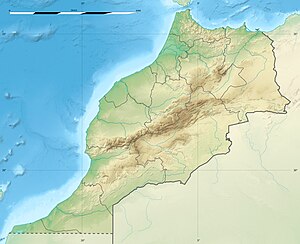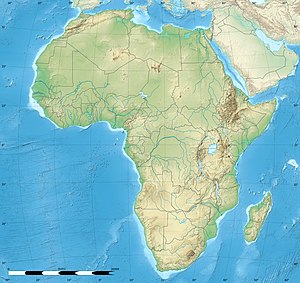Khouribga (Moroccan Arabic: خريبڭة, romanized: khurībga, [xuriːbɡa]) is the capital of Khouribga Province in the Béni Mellal-Khénifra region, Morocco. With a population of 196,196 (2014 census),[1] Khouribga owes its growth to the phosphate deposits nearby.
Khouribga
خريبڭة | |
|---|---|
| Nickname: Phosphate City | |
| Coordinates: 32°53′N 6°55′W / 32.883°N 6.917°W | |
| Country | |
| Region | Béni Mellal-Khénifra |
| Province | Khouribga |
| Government | |
| • Mayor | M’hamed Zakrani (Istiqlal Party) (2021) |
| • Governor | Hamid Chnouri (2018) |
| Area | |
• Total | 52 km2 (20 sq mi) |
| Elevation | 786 m (2,579 ft) |
| Population (2014)[1] | |
• Total | 196,196 |
| • Density | 4,083.46/km2 (10,576.1/sq mi) |
| • Rank | 15th in Morocco |
| Time zone | UTC+1 (CET) |
| Postal Code | 25000 |
Geography
editLocated at 107 km from Casablanca, 154 km from the capital, Rabat, more than 200 km from the city of Marrakesh, and about 99 km from the city of Beni Mellal and 60 km from the city of Settat and 34 km from the city of Oued Zem.
Khouribga is located 820 meters above sea level on the Ouardigha plateau. The city was founded in 1923 by the authorities of the French protectorate when they discovered phosphate in the region,[2] for which Morocco is considered to be the biggest exporter in the world.[3] There are several mines in the province, most notably the mine of Sidi Shennan near the town of Oued Zem, which lies 30 km from the village of Boulanouare (5 km) and the town of Boujniba (10 km) and the village of Hattane.
The Province of Khouribga is bordered by the Province of Beni Mellal in the east, Province of Ben Slimane in the west, the Province of Settat in the south, and Khémisset Province in the north.
Climate
editKhouribga has a hot-summer Mediterranean climate (Köppen climate classification Csa). In winter there is more rainfall than in summer. The average annual temperature in Khouribga is 17.2 °C (63.0 °F). About 432 mm (17.01 in) of precipitation falls annually.
| Climate data for Khouribga | |||||||||||||
|---|---|---|---|---|---|---|---|---|---|---|---|---|---|
| Month | Jan | Feb | Mar | Apr | May | Jun | Jul | Aug | Sep | Oct | Nov | Dec | Year |
| Mean daily maximum °C (°F) | 16.7 (62.1) |
17.6 (63.7) |
19.8 (67.6) |
22.6 (72.7) |
26.1 (79.0) |
30.6 (87.1) |
36.0 (96.8) |
36.2 (97.2) |
32.5 (90.5) |
27.0 (80.6) |
19.3 (66.7) |
17.1 (62.8) |
25.1 (77.2) |
| Daily mean °C (°F) | 9.9 (49.8) |
10.4 (50.7) |
12.4 (54.3) |
14.6 (58.3) |
17.8 (64.0) |
21.9 (71.4) |
26.1 (79.0) |
26.7 (80.1) |
23.8 (74.8) |
19.2 (66.6) |
12.7 (54.9) |
10.6 (51.1) |
17.2 (62.9) |
| Mean daily minimum °C (°F) | 3.2 (37.8) |
3.3 (37.9) |
5.0 (41.0) |
6.6 (43.9) |
9.5 (49.1) |
13.2 (55.8) |
16.3 (61.3) |
17.2 (63.0) |
15.1 (59.2) |
11.4 (52.5) |
6.1 (43.0) |
4.1 (39.4) |
9.2 (48.7) |
| Average precipitation mm (inches) | 60 (2.4) |
58 (2.3) |
57 (2.2) |
52 (2.0) |
22 (0.9) |
7 (0.3) |
2 (0.1) |
3 (0.1) |
12 (0.5) |
36 (1.4) |
52 (2.0) |
71 (2.8) |
432 (17) |
| Source: https://en.climate-data.org/location/715066/ | |||||||||||||
Economy
editPhosphate
editThe Province of Khouribga has a large phosphate reserve estimated 35 to 40 billion cubic meters, which has been mined since 1920s and is ranked first at the international level. Also Khouribga is one of the cities that brings hard currency and that is due to its community residents from Italy.
The phosphate mines in the Ouled Abdoun Basin are notable source of fossils, especially Mosasaur and Sharks jaws and teeth.
Industrial activities
editIn addition to phosphate mining, the province knew the emergence of other industries in economic sectors such as:
Industrial areas
editThe province has three Industrial zones:
- The industrial zone of Khouribga (industrial district): 20 hectares (234 partitions) and 13 operating industrial units plus the expansion of the zone.
- The industrial zone of Oued Zem.
- The industrial zone of Bejaad.
Services
editThe province has several services, among them:
- 25 bank agencies
- 6 insurance agencies
- 7 travel agencies
- 2 railways with daily trips with a project to build a modern station.
Agriculture
editThe agricultural lands is divided into 50% arable land, 20% forests, 30% unused land. Livestock is the most important source of income for the rural population, the herd is estimated to be:
- Goats: 30.000-60.000 heads
- Equidae: 40.000-60.000 heads
- Cows: 50.000-70.000 heads
- Sheep: 500.000-600.000 heads
Handicrafts
editThe handicrafts sector represents a sizable part of the local economy with 9 cooperatives (260 members), and a handicrafts association.
Health
editThe facilities cover most of the province with:
- 6 rooms
- 3 provincial hospitals
- 20 health centers
- 7 urban health centers
- 9 rural clinics
Twin towns – sister cities
editKhouribga is twinned with:
- Alcamo, Italy[citation needed]
- Erzincan, Turkey[citation needed]
- Karaj, Iran[citation needed]
Notable people
edit- Adam Masina, professional footballer
- Hicham Mahdoufi, Former international footballer
- Hindi Zahra, international singer
- Hind Dehiba, née Chahyd, born on March 17, 1979, in Khouribga, a Moroccan-French middle-distance runner
- Jawad El Yamiq, professional footballer
- Mohamed Saïd El Wardi, Former middle-distance runner
- Otmane El Assas, former professional footballer
- Rababe Arafi, middle-distance runner
- Walid El Karti, professional footballer
See also
editReferences
edit- ^ a b "POPULATION LÉGALE DES RÉGIONS, PROVINCES, PRÉFECTURES, MUNICIPALITÉS, ARRONDISSEMENTS ET COMMUNES DU ROYAUME D'APRÈS LES RÉSULTATS DU RGPH 2014" (in Arabic and French). High Commission for Planning, Morocco. 8 April 2015. Retrieved 29 September 2017.
- ^ Shafto, Sally. "It All began in Khouribga: the 15th Festival du Cinéma Africain de Khouribga". Retrieved 2023-12-14.
- ^ "Morocco Remains World's Largest Exporter of Phosphate, Phosphoric Acid". Morocco World News.


